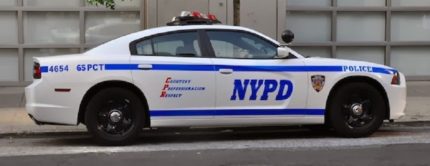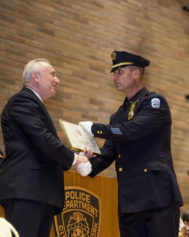In a development that could have alarming implications for Black people in New York, NYPD Commissioner William Bratton and Patrolmen’s Benevolent Association President Pat Lynch called on the state legislature to stiffen the penalties the public faces for resisting arrest in New York.
The legislators indicated that they may be in the process of changing the penalty for resisting arrest from a misdemeanor to a felony during a hearing on public security convened by several committees of the the New York State Senate. Asked about such a change, Bratton suggested it’s an idea he enthusiastically supports.
Bratton told the State Senate, according to Buzzfeed, “If you don’t want us to enforce something, don’t make it a law.”
After the hearing, he said to reporters, “We need to get around this idea that you can resist arrest. One of the ways to do that is to give penalties for that.”
If such a change were made by the legislature, the penalty for resisting arrest could leap from a maximum of one year in prison to anything from four years of probation to life in prison.
Lynch also called for enhanced penalties against protesters, asking the legislature to make assaulting a police officer at a public assembly a Class B felony, which would carry a penalty of up to 25 years in prison.
“We believe this change in law is necessary to deter the type of conduct we saw during last month’s demonstrations,” Lynch said, according to his prepared remarks.
This is a classic example of how the powerful can change laws behind the scenes that have dramatic impacts on Black communities. After months of angry demonstrations in New York and across the country to protest police taking Black lives and not being punished, the legislature and police officials appear to be conspiring to give police even more power to destroy the Black community. The issue is potentially huge for young African-Americans—St. Louis area residents have told Atlanta Blackstar that some of the young people arrested in protests over the summer after Michael Brown’s death are still in jail because they weren’t able to make bail.
In addition, many analyses have indicated that overly aggressive police offices often use the resisting arrest charge to cover up their aggression—i.e, they needed to use excessive force because the person was resisting arrest.
In New York, a 2014 report from WNYC indicated that 40 percent of resisting-arrest cases are brought in by just 5 percent of police officers.
“There’s a widespread pattern in American policing where resisting arrest charges are used to sort of cover—and that phrase is used—the officer’s use of force,” police accountability expert Sam Walker of the University of Nebraska told WNYC. “Why did the officer use force? Well, the person was resisting arrest.”
Last September, the New York Times quoted an anonymous police official as saying the NYPD was tracking the officers who bring an extreme amount of resisting arrest charges as a red flag for use of excessive force.
“If resisting arrest is a reasonable indicator of the use of force, department statistics for 2013 suggest that officers used force more regularly than indicated on arrest reports,” the Times wrote. “In 2013, there were 12,453 arrests that included charges of resisting arrest, about 3.1 percent of all arrests, thousands more than the total number of recorded uses of force.”
So to increase the charge to a felony would be handing even more power and authority over to these bad cops to potentially ruin many Black lives.
During the hearing, there apparently was a disagreement between Bratton and Lynch about the continued use of the “broken windows” philosophy of policing, which many critics have argued is racist in its enforcement of quality of life crimes.
Bratton defended the policy while Lynch said the department’s emphasis on statistics, numbers, and low-level arrests was the fundamental cause of the public’s mistrust in the police.
“As long as I’m commissioner, enforcing broken windows will be a priority of this department,” Bratton said, describing it as “weeding a beautiful garden,” according to Buzzfeed.
But Lynch said that the theory had “driven a wedge” between the police and civilians and given rise to the anti-cop climate that, he said, culminated in last year’s murder of two police officers.
“If the problem is solved and the numbers are down, so be it,” Lynch said, implying that the city had changed from the place in the 1990s when homicides reached more than 2,000 per year.



